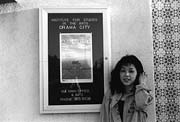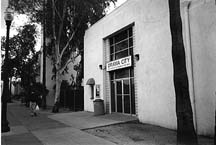The Highly Praised American Concerts
|
At times, because performers are tenser than they need to be at concerts
in Japan, the idea of letting people enjoy the music gets pushed off to
the side somewhere. No doubt it is important for the performer to give a
good performance, but if they don't also experience the happiness of the
music along with the audience, the concert has no meaning--in my opinion
at least.
On the day of the concert, we were welcomed by the smiling faces of the
staff again at Drama City. The empty waiting room was certainly large enough.
The concert program was made up of "Apologetica" in the first
half, and "Temple of Lament" in the second. The former was performed
this time by 12 singers. The dressing room was buzzing with energy with
these 12 young people in it, and seeing them eat big sandwiches before the
performance was a memorable sight for me. As I felt a little overwhelmed
by everything, I waited for my turn and after a while went on to sing in
an amazingly relaxed state. Only once in the middle of the piece, I thought,
"This is America," but that didn't make me nervous. Afterwards,
I was complimented and responded by shaking many hands and repeatedly saying,
"Thank you." Even though I had heard stories about how Americans
tend to exaggerate more than Japanese, I was surprised at the response.
Cut to April 18. Over the last few days, the temperature in Arizona had
risen during the daytime. There were some people in summer clothing, and
I saw some people swimming in the hotel pool. This was the day of the second
concert, which was to be held at a hall on the university's west campus.
It was a flat, but large space with various kinds of equipment set up inside.
(At the very least, the west campus had one other hall like this--this too
was nothing like a Japanese university.) For this concert, three pieces
by the composer Richard LERMAN and three by Daniel Lentz were performed.
In Japan, it would have been unthinkable to have a concert at 8pm on a university
campus, but people began to gather and I was introduced to so many people
I couldn't keep track of them all. Since this was a different space, it
had a slightly different atmosphere, but I was again able to relax and sing
"Temple of Lament." After the concert, I was greeted again with
an avalanche of compliments. Just as I was considering the rich variety
of expressions Americans have, I was suddenly embraced by someone speaking
a mile a minute. I think they were telling me how moved they had been by
my singing. One after another people I had never before met gave me their
impressions of the performance, but I began to falter, and responded only
with a "thank you" as I shook their hands. Faced with these unfamiliar
customs, my English became more and more confused. |
|

